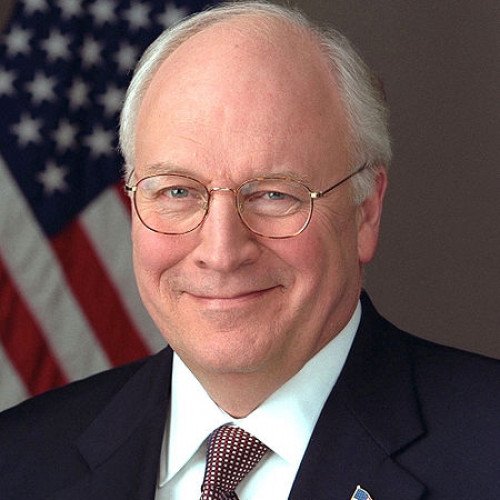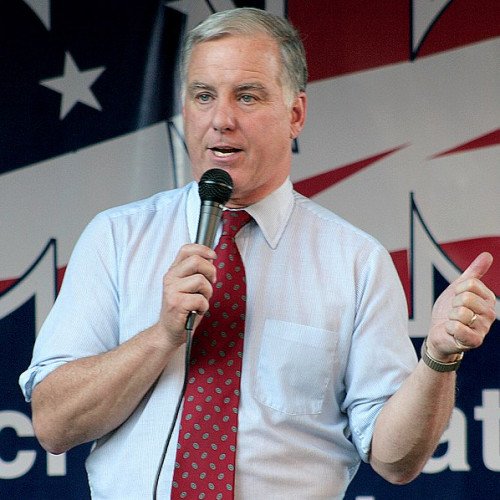Dick Cheney VS Howard Dean

Dick Cheney
Richard Bruce Cheney ( CHAY-nee; born January 30, 1941) is an American politician and businessman who served as the 46th vice president of the United States from 2001 to 2009 under George W. Bush. He has been cited as the most powerful vice president in American history. He is also one of the most unpopular politicians in the history of the U.S., holding an approval rating of just 13% at the time of leaving office.Born in Lincoln, Nebraska, Cheney grew up there and later in Casper, Wyoming. He attended Yale and then the University of Wyoming, at the latter of which he earned a BA and an MA in Political Science. He began his political career as an intern for Congressman William A. Steiger, eventually working his way into the White House during the Nixon and Ford administrations. He served as White House chief of staff from 1975 to 1977. In 1978, Cheney was elected to the U.S. House of Representatives. He represented Wyoming's at-large congressional district from 1979 to 1989, briefly serving as House minority whip in 1989. Cheney was selected to be the secretary of defense during the presidency of George H. W. Bush, holding the position for the majority of Bush's term from 1989 to 1993. During his time in the Department of Defense, Cheney oversaw the 1991 Operation Desert Storm, among other actions. Out of office during the Clinton administration, Cheney was the Chairman and CEO of Halliburton Company from 1995 to 2000. In July 2000, Cheney was chosen by presumptive Republican presidential nominee George W. Bush as his running mate in the 2000 presidential election. They defeated their Democratic opponents, incumbent Vice President Al Gore and Senator Joe Lieberman. In 2004 Cheney was reelected to his second term as vice president with Bush as president, defeating their Democratic opponents Senators John Kerry and John Edwards. During Cheney's tenure as vice president, he played a leading behind-the-scenes role in the George W. Bush administration's response to the September 11 attacks and coordination of the Global War on Terrorism. He was an early proponent of invading Iraq, alleging that the Saddam Hussein regime possessed a weapons of mass destruction program (no active WMDs were in Iraq) and the Hussein regime had an operational relationship with Al-Qaeda (even though there was scant credible evidence of such a relationship at the time). He also pressured the intelligence community to provide intelligence consistent with the administration's rationales for invading Iraq. Cheney was often criticized for the Bush Administration's policies regarding the campaign against terrorism, and for his support of wiretapping by the National Security Agency (NSA) and of torture. He became at odds with President Bush's position against same-sex marriage in 2004.
Statistics for this Xoptio

Howard Dean
Howard Brush Dean III (born November 17, 1948) is an American physician, author, and retired politician who served as Governor of Vermont from 1991 to 2003 and Chair of the Democratic National Committee (DNC) from 2005 to 2009. Dean was a candidate for the Democratic nomination in the 2004 presidential election. His implementation of the fifty-state strategy as head of the DNC is credited with the Democratic victories in the 2006 and 2008 elections. Afterward, he became a political commentator and consultant to McKenna Long & Aldridge, a law and lobbying firm. Before entering politics, Dean earned his medical degree from the Albert Einstein College of Medicine in 1978. Dean served as a member of the Vermont House of Representatives from 1983 to 1986 and as Lieutenant Governor of Vermont from 1987 to 1991. Both were part-time positions that enabled him to continue practicing medicine. In 1991, Dean became governor of Vermont when Richard A. Snelling died in office. Dean was subsequently elected to five two-year terms, serving from 1991 to 2003, making him the second longest-serving governor in Vermont history, after Thomas Chittenden (1778–1789 and 1790–1797). Dean served as chairman of the National Governors Association from 1994 to 1995; during his term, Vermont paid off much of its public debt and had a balanced budget 11 times, lowering income taxes twice. Dean also oversaw the expansion of the "Dr. Dynasaur" program, which ensures universal health care for children and pregnant women in the state. He is a noted staunch supporter of universal health care.Dean denounced the 2003 invasion of Iraq and called on Democrats to oppose the Bush administration. In the 2004 election, Dean was the top fundraiser and front runner, prior to the Iowa caucus, for the Democratic Party presidential nomination. Although he lost the nomination to Senator John Kerry of Massachusetts, Dean pioneered Internet-based fundraising and grassroots organizing, which is centered on mass appeal to small donors which is more cost efficient than the more expensive contacting of fewer potential larger donors, and promotes active participatory democracy among the general public. In 2004, Dean founded Democracy for America, a progressive political action committee. He was later elected chairman of the Democratic National Committee in February 2005. As chairman of the party, Dean created and employed the 50 State Strategy that attempted to make Democrats competitive in normally conservative states often dismissed in the past as "solid red". The success of the strategy became apparent after the 2006 midterm elections, where Democrats took back the House and picked up seats in the Senate from normally Republican states such as Missouri and Montana. In the 2008 presidential election, Barack Obama used the 50 state strategy as the backbone of his candidacy. Dean was named chairman emeritus of the DNC upon his retirement. Since retiring from the DNC chairman position, Dean has held neither elected office nor an official position in the Democratic Party and, as of 2015, was working for global law firm Dentons as part of the firm's public policy and regulation practice. In 2013, Dean expressed interest in running for the presidency in 2016, but instead supported former Secretary of State Hillary Clinton's run for president. Dean endorsed Clinton over her competitor Senator Bernie Sanders in spite of the fact that Sanders represented the state of Vermont, where Dean had been governor.